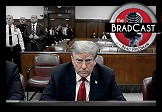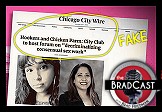READER COMMENTS ON
"The U.S. Election Assistance Commission Comes Under Fire"
(8 Responses so far...)
COMMENT #1 [Permalink]
...
andi novick
said on 4/23/2007 @ 9:18 pm PT...
Unfortunately Hinchey's office sponsored Holt. I wrote to his office but got no response. Maybe we need more concerted attention (not just whoever happened to write to which congressman supporting Holt) because authorizing Holt's bill, thereby securing this phony agency- which has shown itself to be nothing more than cronies (as you've shown from their history as the predecessor NASED) is one of the worse parts of Holt II. Supporting Holt is inconsistent with the position Hinchey's taking- so if we end up with the EAC becoming a permanent fixture as a result of the Holt bill- where does that leave us?
Hinchey's withdrawing support of the Holt bill would be a very good outcome.
COMMENT #2 [Permalink]
...
Bev Harris
said on 4/23/2007 @ 10:26 pm PT...
Brad, I'm glad of course to see the media attention to what is really just the tip of the iceberg with the corrupt EAC. Now I ask you, and every reader, to imagine just one simple twist on this story:
Suppose a congress of a different stripe happened to be elected. Would we be seeing anything meaningful in terms of stepped up oversight?
Now, Black Box Voting and some of our most honorable colleagues got smacked around pretty good for taking a strong stance that we cannot risk extending or further empowering the EAC, which is the most devastatingly inappropriate provision in the Holt Bill. The very surprising justifications for keeping the empowerment of the EAC --- and under the Executive Branch (White House), no less! --- in the Holt Bill are just plain inadequate.
(1) "The EAC is here to stay"
(2) "Well oversight is going to be improved, yeah, that's right, we'll step up congressional oversight."
Is this the United States of Myopia? Hello?
Making the EAC permanent, and keeping it under the White House, means just that: PERMANENT. It's unprecedented. Bad things can and will happen, if not under this congress, under another.
Just 40 years ago we had a president resign. Why? He was engaged in Abuse of Power. And in those days we had an aggressive and robust set of political investigative reporters in the mainstream media, certainly not the case right now, when most reporters have forgotten how to prepare follow up questions and MSM budgets have slashed out the investment in investigative journalism.
What we are really doing, with the Holt Bill which attempts to force us all to PERMANENTLY empower the EAC under the EXECUTIVE BRANCH, is we are being forced, in exchange for the promise of a paper trail, to put democracy itself on the razor's edge.
I was a bit abrupt when dealing with the issue of whether to allow DREs --- of course, they've gotta go --- but the whole argument is meaningless if we permanently empower an agency under the Executive Branch.
That is an act that literally destabilizes democracy. We've had this nation for 230 years. What a careless, risk-loving, future-generation-abandoning citizenry we will prove to be if we allow this to happen.
It's time to split the EAC away from the Holt Bill and drive a stake through its heart.
COMMENT #3 [Permalink]
...
Dredd
said on 4/24/2007 @ 6:05 am PT...
Bev #2
The flack I gave was because you keep saying that the EAC is "under the White House" because the president nominates its members, and I keep saying that is a mis-characterization.
If "under the White House" was an exact characterization then the Supreme Court and all federal courts would also be "under the White House" simply because the president nominates the people who are to be considered to become judges.
That nomination, however, is not the end of it, because the Senate can and does reject nominations. Stretch arguments turn away people in the know.
The real facts, as I pointed out in other threads, is that the president can only nominate potential EAC members. The Senate will then reject or accept them. Like all the courts, cabinet members, etc., it is cooperative effort between many people.
That is our time-warn constitutional process and to criticize that process is an inaccuracy on these facts.
Simply because a person does a bad job once they get in, does not condemn the process because the blame goes to the person doing the bad job.
If your approach were followed all someone would have to do is a bad job and we throw out the constitutional process because during its use there were bad results.
That is fuzzy logic and it does no good to criticize the constitutional process because a person goes bad.
Some or all of the EAC people have gone bad, but we should call for their resignation and replacement. We should not call for the replacement of the nominating and confirmation process that the constitution describes. It isn't even a valid reason to get rid of the EAC because there are people who could do a good job there. Think of Debra Bowen, Bruce Funk, Ion Sancho, and people of that ilk.
The oversite hearing this post mentions is not a hearing about the bad constitutional process, but instead is a hearing about the bad behavior of some of the members of the commission.
I am sure you, Brad, John Gideon, Jim March, and people of that sort would do a hell of a better job than the current membership, however, I do not think Bush would nominate any of you even tho I think congress would approve of you folk.
But we need not get rid of the office of the presidency simply because the current person in that office is a bad guy.
It is a "don't throw the baby out with the bathwater" type of thing IMO.
COMMENT #4 [Permalink]
...
Rob
said on 4/24/2007 @ 9:15 am PT...
Totally off topic, but I didn't know where else to ask: Is there any news about the recent French elections and electronic voting machines? I recall reading somewhere (I can't remember where, but it certainly was not in any mainstream media) that they had problems with some French-made electronic machines that were not recording a certain percentage of votes, and some voters being turned away from the polls due to machine problems.
COMMENT #5 [Permalink]
...
Bev Harris
said on 4/24/2007 @ 12:12 pm PT...
Dredd, you're wrong.
It is correct to highlight the issue that the EAC is under the EXECUTIVE BRANCH.
Only under the executive branch can regulatory powers be wielded. If the EAC were under the legislative branch, its powers would be advisory, not regulatory.
A president can indeed nominate exceptionally inappropriate people --- and has done so --- and the congress does not necessarily hold hearings or do any due diligence at all --- and recent history shows that this is true even with a Democratic congress.
The establishment of a body under the executive branch which holds de facto control over election mechanics is unprecedented in the history of this nation.
"Don't throw the baby out with the bathwater" implies there was something good about the EAC to begin with. There is not --- it was designed to dole out money to force voting machines down the throats of citizens who never asked for them in the first place. It was designed to sunset in 2005 after doling out the loot. Instead, it began expanding its powers, and abusing its powers.
While you want to focus on whether this guy or that guy is good or bad, what I am focusing on is whether the STRUCTURE is good or bad. You cite examples that don't apply --- there is nothing in the Constitution that says we should have an Election Assistance Commission, though the founders did install a presidency in the structure of our nation.
The EAC was not supposed to come into being as an executive branch agency AT ALL --- but, thanks to the mechanizations of Steny Hoyer, who unfortunately is skating through all this unscathed since the Democrats don't like to investigate their own --- thanks to ol' Steny, at the midnight hour the EAC ended up under the executive branch. Had it not been set up to sunset in 2005, there would have been an outcry from several of the architects of HAVA over that.
No, Dredd, you need to rethink the EAC --- not in the context of what it could be if "good guys" ran it, but in terms of the risk it puts our government into if (and when) the "bad guys" happen to be in control.
COMMENT #6 [Permalink]
...
the_zapkitty
said on 4/24/2007 @ 7:52 pm PT...
Time to begin pulling it together...
Holt II is a conglomeration of proposals being fast-tracked to passage, with many proposals seemingly granting election integrity activists' fondest wishes through repeated use of key words... "paper ballots", "source code"... "no internet"... key words that were essentially used as buzzwords to inflame passions on the issues...
... and yet the bill keeps falling strangely short of what is seemingly promised by the key words.
DRE's will actually decide elections, not paper ballots. Disclosure of all EVM source code would shut down all EVM's, so that must be rewritten. Critical election gear is still allowed to be hooked to the internet.
The bill is being fast-tracked because of the 2008 elections, or so we're told ("Pass it NOW! NOW! NOW!")... and yet the bill deals falteringly with complex constitutional, legislative, and technological issues and for some reason no one in the drafting stages matched the pieces and parts together to see that the whole did not perform as seemingly promised by the sum of the parts.
This bill needs more time, and first needs to be stripped of the legislative giveaways that was built into it and offered to existing entities to buy support for its passage... such "pork" no longer needs to be be offered as it becomes clear to Americans that our election systems have been as badly screwed with as other parts of government.
It's a needlessly large conglomeration so if the pork is stripped it can be divided into two sections...
first: a bill with only the immediate, but temporary, actions needed to safeguard the 2008 elections as much as possible given the current operational realities. This will also be a test of Democratic self-control... can they make a temporary patch and keep their word? It will also test their actual commitment to citizen oversight- even if the citizens actually doing the overseeing can't offer the politicos all the... goodie$... that big-name acronym pacs like PFAW can.
second: a bill that uses the time bought by the first bill, and hopefully uses it wisely for true, effective election reform. Then perhaps the first fruits of that bill can see light in 2010, and have everything in place and tested by 2012.
...
... ...
... ... ...
Naw... too sensible... 
COMMENT #7 [Permalink]
...
Bev Harris
said on 4/24/2007 @ 10:25 pm PT...
Zapkitty makes sense. Again.
The bill is being fast-tracked because of the 2008 elections, or so we're told ("Pass it NOW! NOW! NOW!")... and yet the bill deals falteringly with complex constitutional, legislative, and technological issues and for some reason no one in the drafting stages matched the pieces and parts together
COMMENT #8 [Permalink]
...
Margaret Groarke
said on 5/6/2007 @ 7:43 pm PT...
Peggy Sims was an employee of the Federal Election Commission before the existence of the EAC. She often helped me access info on voter turnout, in her role at that agency.


 SCOTUS Suddenly Worried About Overcriminalization ... for J6 Insurrectionists: 'BradCast' 4/17/24
SCOTUS Suddenly Worried About Overcriminalization ... for J6 Insurrectionists: 'BradCast' 4/17/24 'Trump Media' Plummeting, MAGA Buyers Losing Life Savings: 'BradCast' 4/16/24
'Trump Media' Plummeting, MAGA Buyers Losing Life Savings: 'BradCast' 4/16/24 'Green News Report' 4/16/24
'Green News Report' 4/16/24
 Trump's First Criminal Trial, for Cheating in 2016, Begins in NY: 'BradCast' 4/15/24
Trump's First Criminal Trial, for Cheating in 2016, Begins in NY: 'BradCast' 4/15/24 Sunday 'Party Like It's 1864' Toons
Sunday 'Party Like It's 1864' Toons Biden Closes 'Gun Show Loophole'; Repubs Turn Desperate: 'BradCast' 4/11/24
Biden Closes 'Gun Show Loophole'; Repubs Turn Desperate: 'BradCast' 4/11/24  'Green News Report' 4/11/24
'Green News Report' 4/11/24 'Pink Slime': Fake 'Local News' Sites Proliferating in Advance of Election: 'BradCast' 4/10/24
'Pink Slime': Fake 'Local News' Sites Proliferating in Advance of Election: 'BradCast' 4/10/24 Dirty Tricks and the Dirtiest Candidate Of All Time: 'BradCast' 4/9/24
Dirty Tricks and the Dirtiest Candidate Of All Time: 'BradCast' 4/9/24 'Green News Report' 4/9/24
'Green News Report' 4/9/24 'Titanic Law' Reform Just Tip of Iceberg in Quest for Key Bridge Accountability: 'BradCast' 4/8/24
'Titanic Law' Reform Just Tip of Iceberg in Quest for Key Bridge Accountability: 'BradCast' 4/8/24 Sunday 'Dark Days Indeed' Toons
Sunday 'Dark Days Indeed' Toons Trump's Very Bad Day in Court(s), Other Good (& Less Good) News: 'BradCast' 4/4
Trump's Very Bad Day in Court(s), Other Good (& Less Good) News: 'BradCast' 4/4 'Green News Report' 4/4/24
'Green News Report' 4/4/24 WI Supremes May Restore Drop-Box Voting
WI Supremes May Restore Drop-Box Voting WI Voters Approve Election Crippling Ballot Measures: 'BradCast' 4/3/24
WI Voters Approve Election Crippling Ballot Measures: 'BradCast' 4/3/24  Politico's Josh Gerstein Owes a Retraction
Politico's Josh Gerstein Owes a Retraction More GOP Election Fraud; Overdue Justice for Crystal Mason: 'BradCast' 4/2/24
More GOP Election Fraud; Overdue Justice for Crystal Mason: 'BradCast' 4/2/24 Last Week Today with OG Bloggers:
Last Week Today with OG Bloggers: It's Up to You, New York: 'BradCast' 3/21/24
It's Up to You, New York: 'BradCast' 3/21/24 'It All Comes Down to Brett and Amy': 'BradCast' 3/20/24
'It All Comes Down to Brett and Amy': 'BradCast' 3/20/24 American 'Bloodbath': 'BradCast' 3/19/24
American 'Bloodbath': 'BradCast' 3/19/24
 VA GOP VOTER REG FRAUDSTER OFF HOOK
VA GOP VOTER REG FRAUDSTER OFF HOOK Criminal GOP Voter Registration Fraud Probe Expanding in VA
Criminal GOP Voter Registration Fraud Probe Expanding in VA DOJ PROBE SOUGHT AFTER VA ARREST
DOJ PROBE SOUGHT AFTER VA ARREST Arrest in VA: GOP Voter Reg Scandal Widens
Arrest in VA: GOP Voter Reg Scandal Widens ALL TOGETHER: ROVE, SPROUL, KOCHS, RNC
ALL TOGETHER: ROVE, SPROUL, KOCHS, RNC LATimes: RNC's 'Fired' Sproul Working for Repubs in 'as Many as 30 States'
LATimes: RNC's 'Fired' Sproul Working for Repubs in 'as Many as 30 States' 'Fired' Sproul Group 'Cloned', Still Working for Republicans in At Least 10 States
'Fired' Sproul Group 'Cloned', Still Working for Republicans in At Least 10 States FINALLY: FOX ON GOP REG FRAUD SCANDAL
FINALLY: FOX ON GOP REG FRAUD SCANDAL COLORADO FOLLOWS FLORIDA WITH GOP CRIMINAL INVESTIGATION
COLORADO FOLLOWS FLORIDA WITH GOP CRIMINAL INVESTIGATION CRIMINAL PROBE LAUNCHED INTO GOP VOTER REGISTRATION FRAUD SCANDAL IN FL
CRIMINAL PROBE LAUNCHED INTO GOP VOTER REGISTRATION FRAUD SCANDAL IN FL Brad Breaks PA Photo ID & GOP Registration Fraud Scandal News on Hartmann TV
Brad Breaks PA Photo ID & GOP Registration Fraud Scandal News on Hartmann TV  CAUGHT ON TAPE: COORDINATED NATIONWIDE GOP VOTER REG SCAM
CAUGHT ON TAPE: COORDINATED NATIONWIDE GOP VOTER REG SCAM CRIMINAL ELECTION FRAUD COMPLAINT FILED AGAINST GOP 'FRAUD' FIRM
CRIMINAL ELECTION FRAUD COMPLAINT FILED AGAINST GOP 'FRAUD' FIRM RICK SCOTT GETS ROLLED IN GOP REGISTRATION FRAUD SCANDAL
RICK SCOTT GETS ROLLED IN GOP REGISTRATION FRAUD SCANDAL VIDEO: Brad Breaks GOP Reg Fraud Scandal on Hartmann TV
VIDEO: Brad Breaks GOP Reg Fraud Scandal on Hartmann TV RNC FIRES NATIONAL VOTER REGISTRATION FIRM FOR FRAUD
RNC FIRES NATIONAL VOTER REGISTRATION FIRM FOR FRAUD EXCLUSIVE: Intvw w/ FL Official Who First Discovered GOP Reg Fraud
EXCLUSIVE: Intvw w/ FL Official Who First Discovered GOP Reg Fraud GOP REGISTRATION FRAUD FOUND IN FL
GOP REGISTRATION FRAUD FOUND IN FL


































